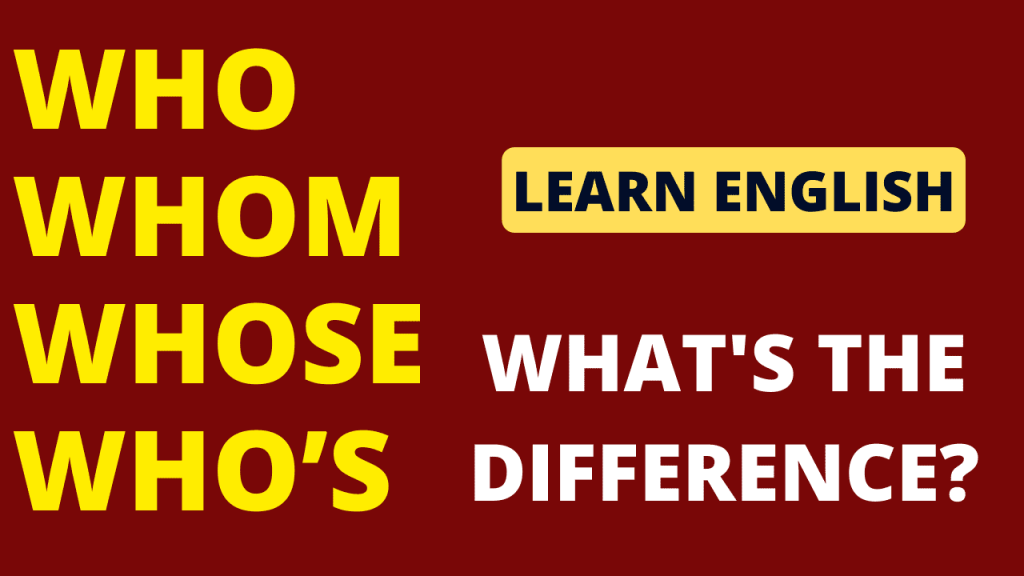
In the English language, the words “who,” “whom,” “whose,” and “who’s” can often be confused due to their similar spellings and pronunciation. However, each of these words serves a distinct purpose in grammar and communication. Understanding the differences between them is essential for clear and effective writing. In this article, we’ll explore their nuances, and provide examples and tips for proper use.
Understanding WHO
Function: Subject pronoun
Usage: Refers to the person doing the action or being something in the sentence.
Usage examples:
- Who is coming to the party tonight? (Subject of the verb “is coming”)
- The teacher asked who finished their homework. (Subject of the verb “finished”)
- Do you know who won the competition?
- He asked who was responsible for the project
Explaining WHOM
Function: Object pronoun
Usage: Refers to the person receiving the action or the object of a preposition.
Usage examples:
- To whom did you give the book? (Object of the preposition “to”)
- Whom did she invite to the event? (Object of the verb “invited”)
- The teacher, whom everyone respected, retired last year.
- To whom should I address this letter? (Object of the preposition “to”)
Delving into WHOSE
Function: Possessive pronoun
Usage: Indicates ownership or possession of a person.
Usage examples:
- Whose phone is ringing? (Shows ownership of the phone)
- The woman whose dog ran away is looking for it. (Shows ownership of the dog)
- Whose book is this?
- Do you know whose car is parked outside?
- The student, whose grades improved significantly, was awarded a scholarship.
Deciphering WHO’S
Function: Contraction of “who is” or “who has”
Usage: Informal way to ask a question about someone’s identity or possession.
Usage examples:
- Who’s there? (Contraction of “who is”)
- Who’s had their coffee? (Contraction of “who has”)
- Who’s going to the concert tonight?
- Do you know who’s in charge of the project?
- He’s the one who’s always late for meetings.
Key Differences between WHO WHOM WHOSE WHO’S
While WHO, WHOM, WHOSE, and WHO’S may sound similar, they serve different grammatical functions:
- WHO is used as a subject pronoun.
- WHOM is used as an object pronoun.
- WHOSE indicates possession.
- WHO’S is a contraction of WHO IS or WHO HAS.
Common Mistakes and How to Avoid Them
These little words can cause big headaches! Here are some common mistakes people make with “who,” “whom,” “whose,” and “who’s,” along with tips to avoid them:
A. Mistake 1: Using “who” as an object pronoun
- Incorrect: For who did you buy that gift?
- Correct: For whom did you buy that gift? (“Whom” is the object of the preposition “for”)
- Tip: Imagine replacing “who” with “him” or “her.” If the sentence sounds awkward, use “whom” instead.
B. Mistake 2: Using “whom” as a subject pronoun
- Incorrect: Whom is coming to dinner?
- Correct: Who is coming to dinner? (“Who” is the subject of the verb “is coming”)
- Tip: Ask yourself if the pronoun is performing the action. If so, use “who.”
C. Mistake 3: Confusing “who’s” and “whose”
- Incorrect: Who’s car is parked outside?
- Correct: Whose car is parked outside? (“Whose” indicates ownership of the car)
- Tip: Remember, “who’s” is a contraction of “who is” or “who has,” while “whose” shows possession.
D. Mistake 4: Using “who’s” in formal writing
- Informal: Who’s giving the presentation today?
- Formal: Who is giving the presentation today?
- Tip: “Who’s” is a convenient shortcut in casual situations, but stick with “who” for formal writing.
Here’s a handy trick to remember the difference:
- Who/Who’s = Subject or question about identity
- Whom/Whose = Object or possession
- Tip: Practice makes perfect! Read examples of correct usage and try incorporating these words into your own writing.
By following these tips, you’ll be well on your way to mastering these tricky words and using them confidently in your communication.
Tips for Proper Usage for WHO WHOM WHOSE WHO’S
- If you can replace the word with “he,” “she,” “they,” or “it,” use “WHO.”
- If you can replace the word with “him,” “her,” “them,” or “it,” use “WHOM.”
- Use WHOSE to indicate possession or ownership.
- Use WHO’S as a contraction for WHO IS or WHO HAS, and only in informal settings for questions.
Conclusion
In conclusion, mastering the differences between WHO, WHOM, WHOSE, and WHO’S is crucial to effective communication in writing. By understanding these simple rules, you can choose the right word with confidence and avoid confusion when using it in your writing and speech.